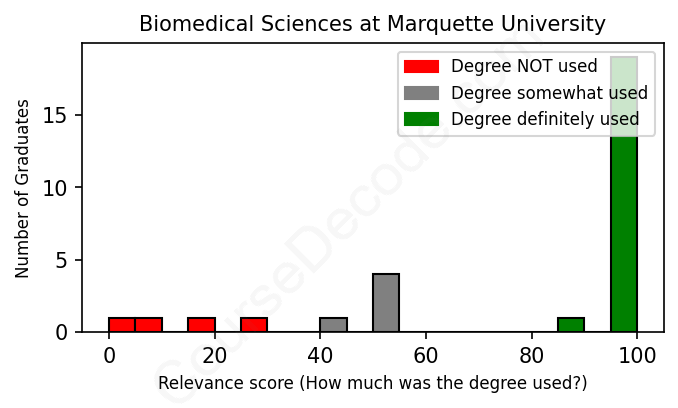
First, some facts. Of the Biomedical Sciences graduates from Marquette University we've analyzed , here's how many have used (or NOT used) their degree in their career:

These are estimates based on AI analysis of 29 LinkedIn profiles (see below).
The verdict? Significantly above average. Overall, with an average relevance score of 78%, Biomedical Sciences graduates from Marquette University have a much higher likelihood (+11%) of finding work in this field compared to the average graduate across all fields:
And for comparison, here's the chart for all profiles we've looked at across all degrees.
Also, after graduating, 68% of these graduates have pursued further education other than another Bachelor's degree (such as a Masters degree or other), compared to the average across all profiles of 35%. This suggests you may need more than just a Bachelors degree to be competitive as a Biomedical Sciences graduate.
See the details:
|
Relevance score: 50% We think this person has gone into a career only somewhat relevant to their degree. We think this person has gone into a career only somewhat relevant to their degree.
DEGREE INFOGraduated in 2014 from Marquette University with a Bachelor of Science - BS in Biomedical Sciences. Also pursued further education since (see below). JOB HISTORY SINCE GRADUATIONDirector Of Learning Knowledge Edge Jun 2018 - Oct 2021 Director of learning; educational consultant and provider  KE May 2018 - Present FURTHER DEGREES DONE SINCE GRADUATINGMaster of Education - MEdWisconsin Lutheran College 2014 - 2019 ABOUTExperienced Science Teacher with a demonstrated history of working in the education management industry. Skilled in Customer Satisfaction, Instructional Design, Curriculum Development, Program Development, and K-12 Education. Strong education professional with a Master of Education from Wisconsin Lutheran College. |
The top 10 most common jobs done by the graduates we've analyzed (ranked most common to least) are:
When looking at the job trajectories of Marquette University graduates with a degree in Biomedical Sciences, it’s clear that there are a few standout professions that many of these people have moved into. A significant number have pursued careers as Physician Assistants or Physical Therapists, both of which directly apply the knowledge and skills obtained from their Biomedical Sciences education. Jobs like these not only require a solid understanding of anatomy and physiology but also involve daily clinical practice, making them very relevant to their studies. Additionally, many graduates have found their way into research roles, such as Research Technicians and Clinical Research Coordinators, which leverage their scientific training and understanding of biomedical concepts.
However, not all paths taken by these graduates are directly related to Biomedical Sciences. A number of alumni have ventured into roles like Software Engineer or Project Support Volunteer, where their biomedical training is not significantly applied. Some have even moved into educational roles or technical positions that might use some related skills but ultimately lack a direct connection to the core knowledge from their degree. All in all, while many have successfully found jobs that align with their Biomedical Sciences background, there is a noticeable divide with some graduates landing in positions that do not primarily utilize their specialized training.
Here is a visual representation of the most common words in job titles for Biomedical Sciences graduates (this is across all Biomedical Sciences graduates we've analyzed, not just those who went to Marquette University):

Looking at the career trajectories of Marquette University Biomedical Sciences graduates, it's evident that many of them find their way into health-related professions shortly after graduation. Right out of school, you'll see a lot of graduates landing positions like Physician Assistants, Physical Therapists, and various roles in healthcare administration and research. For example, graduates from 2011 to 2013 took on roles as Physician Assistants and Physical Therapists, which suggests that these paths are pretty popular and accessible for those just starting out. Others even jump into roles related to research and development in biomedical fields, like Clinical Research Coordinator positions or roles in public health.
Fast forward five to ten years down the line, and you'll notice that a good number of these graduates remain in the healthcare sector, advancing in their careers. Many continue to work as Physician Assistants, with some moving into specialized areas or leadership roles. There are also graduates who have expanded into research-focused roles and have even ventured into teaching or consulting in educational settings. While it's true that some graduates have taken paths that veer away from direct biomedical roles—like teaching or working in sales—most seem to stay connected to the healthcare field in some capacity. Overall, it seems like a significant portion of Marquette’s Biomedical Sciences graduates find solid, meaningful careers in relevant areas, which is pretty encouraging!
Honestly, a Bachelor’s degree in Biomedical Sciences, whether at Marquette University or elsewhere, can be pretty challenging. You’ll dive into a lot of complex topics like biology, chemistry, and anatomy, which can be intense if you're not super passionate about the sciences. While some folks might find it easier than other science-heavy programs, it definitely requires dedication and a solid study routine. If you enjoy problem-solving and have a knack for understanding how living things work at a detailed level, you might find it engaging. But be prepared for late nights with textbooks and lab reports—it’s no walk in the park!
Most commonly, in the LinkedIn profiles we've looked at, it takes people 4 years to finish a Bachelor degree in Biomedical Sciences.
Looking at these Marquette University Biomedical Sciences grads, it seems like many of them have landed solid jobs, especially in healthcare and tech, which can offer pretty good paychecks. For example, several graduates became Physician Assistants and Physical Therapists, fields known for their decent salaries, while others ventured into engineering and research positions, like software engineering and clinical coordination, which also tend to pay well. Even the newer grads are starting off in jobs that usually offer competitive pay, though some are still in internships or entry-level positions. Overall, it looks like they’ve done alright for themselves financially, but as always, individual experiences can vary!
Here is a visual representation of the most common words seen in the "about" section of LinkedIn profiles who have a Bachelor degree in Biomedical Sciences (this is across all Biomedical Sciences graduates we've analyzed, not just those who went to Marquette University). This may or may not be useful:

Here are all colleges offering a Bachelor degree in Biomedical Sciences (ordered by the average relevance score of their Biomedical Sciences graduates, best to worst) where we have analyzed at least 10 of their graduates:
| College | Score | Count |
|---|---|---|
 Western Michigan University Western Michigan University
|
81 | 17 |
 Marquette University Marquette University
|
78 | 29 |
 University of Michigan University of Michigan
|
77 | 10 |
 Colorado State University Colorado State University
|
77 | 19 |
 University at Buffalo University at Buffalo
|
75 | 18 |
 California Polytechnic State University-San Luis Obispo California Polytechnic State University-San Luis Obispo
|
74 | 13 |
 University of Connecticut University of Connecticut
|
74 | 15 |
 Texas A&M University Texas A&M University
|
73 | 59 |
 Auburn University Auburn University
|
71 | 26 |
 Northern Arizona University Northern Arizona University
|
71 | 15 |
 Rensselaer Polytechnic Institute Rensselaer Polytechnic Institute
|
70 | 10 |
 University of Central Florida University of Central Florida
|
69 | 26 |
 University of South Florida University of South Florida
|
68 | 48 |
 Georgia Institute of Technology Georgia Institute of Technology
|
67 | 41 |
 The Ohio State University The Ohio State University
|
64 | 14 |
 Rochester Institute of Technology Rochester Institute of Technology
|
64 | 12 |
 Case Western Reserve University Case Western Reserve University
|
63 | 12 |
 Grand Valley State University Grand Valley State University
|
59 | 35 |
 Arizona State University Arizona State University
|
58 | 12 |